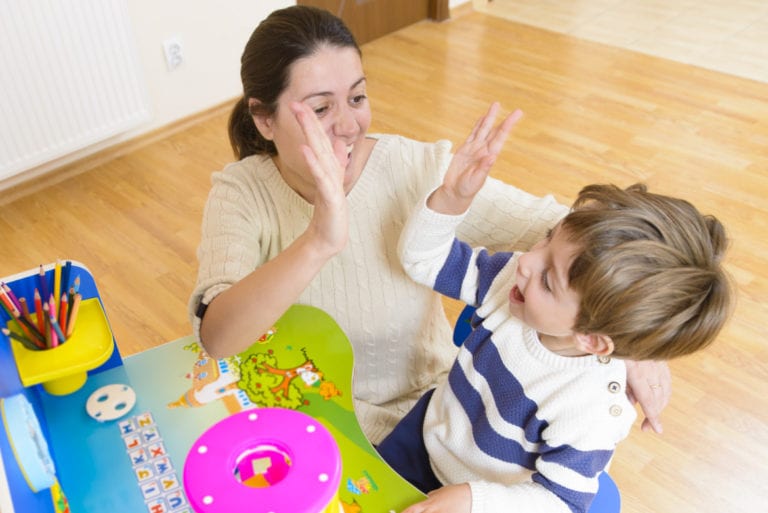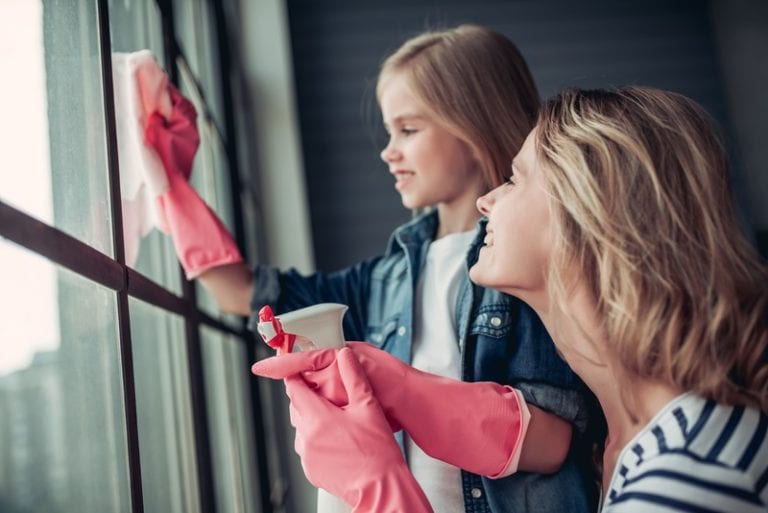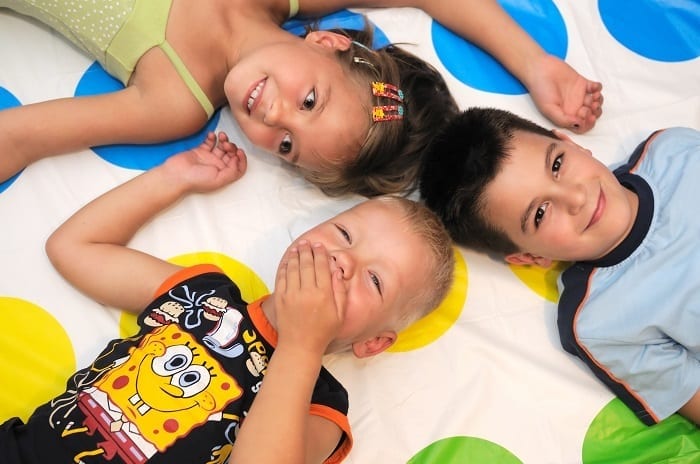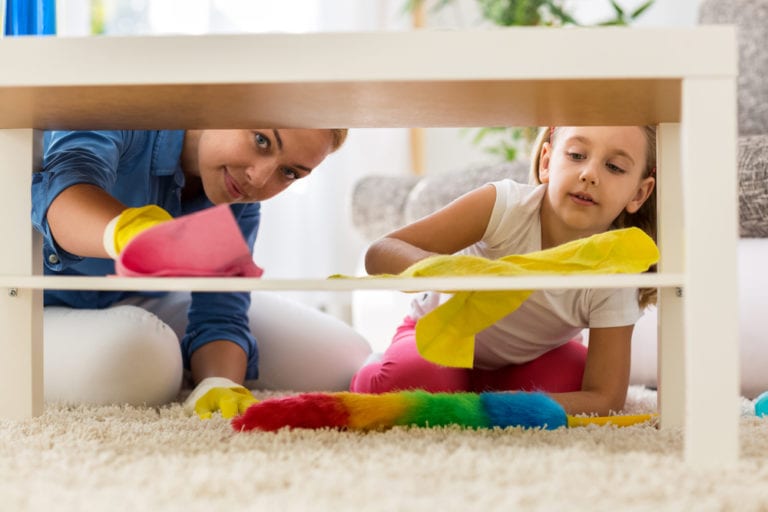REALLY Show Your Kids You Love Them: Essential Tips for Parents – 5 Love Languages
Disclosure: This post may contain affiliate links, meaning I may get a small commission if you decide to make a purchase through my links, at no cost to you.
How to REALLY show your kids you love them is a journey every parent embarks on.
Let’s be real: raising kids is a lot of work Raising children can sometimes feel like we’re in constant motion–running around, making sure they have a healthy lunch, that their shoes are tied, and that they’re doing well in school. It’s an endless cycle and often leaves us too busy to show the love our kids need from us.
We all strive for perfection when it comes to parenting but let’s face it; this isn’t always possible or even beneficial. Our aim should not be creating perfect children but instead fostering an environment where kids feel secure, loved, and valued.
Truth be told when it comes to expressing that deep-rooted affection…it’s not always about the grand gestures.
Nope, showing real love goes beyond buying the latest toys or throwing extravagant birthday parties, even if receiving gifts is a love language.
In fact, mastering how to REALLY show your kids you love them, well folks, that’s what separates the everyday parents from those who create lasting bonds and memories with their children.
Table of Contents:
- The Power of Showing Love to Your Kids
- Communicating Love Through Listening and Engagement
- The Role of Physical Affection in Expressing Love
- Creating Structure for Security
- Navigating Family Dynamics
- Involving Kids in Family Decisions
- The Importance of Fun Time Together
- Cooking & Eating Together – A Recipe for Love
- Fostering Friendships & Positive Relationships
- Newsletters
- FAQs in Relation to How to Really Show Your Kids You Love Them
- Conclusion
The Power of Showing Love to Your Kids
As parents, we consistently endeavor to instill a sense of security and love in our kids.
This is not just about showering them with gifts or saying ‘I love you’ regularly. It’s more profound than that.
Making Children Feel Loved and Secure
A kid’s assurance comes from the place where they grow up – their house, school, and area.
If these environments are filled with love and positivity, children thrive emotionally and psychologically. Research shows a direct correlation between a loving environment at home where children thrive and their overall development.
Nurturing Creativity Through Love
Show your kids you love them by encouraging creativity. This helps build confidence while fostering cognitive growth.
Amy Morin,, an expert on mental strength suggests parents write notes expressing pride in their creative endeavors as one way to show support.
Fostering Learning Through Assurance
Kids need assurance that adult-sized problems won’t affect their world for optimal learning outcomes. By maintaining a stable kid’s environment free from such worries allows freedom for exploration leading to a better understanding of life lessons.
In essence, showing love isn’t merely about verbal affirmations but creating an atmosphere conducive to healthy emotional growth making every child feel special. As we delve deeper into this topic, let us explore how active listening plays a crucial role in communicating parental affection effectively – heading next into ‘Communicating Love through Listening & Engagement’.
Communicating Love Through Listening and Engagement
Showing love to your kids isn’t always about grand gestures. Sometimes, it’s the simple act of active listening that makes them feel loved.
Amy Morin suggests parents, when engaging with their children, should put down electronics and show genuine interest in what they have to say.
The Art of Heart-to-Heart Conversations
Engaging in a meaningful dialogue can be an effective way of demonstrating affection. It helps make kids feel secure knowing their thoughts are valued by you – their parent or guardian.
To initiate these conversations, ask your child about their day; don’t just skim over this part but delve deeper into how events made them feel or what they learned from certain situations. This shows an authentic desire to understand more than just surface-level details which is key in making any child feel loved.
Maintaining eye contact during these discussions also reinforces the message that you’re fully present and interested in understanding your kid’s environment better.
The Role of Physical Affection in Expressing Love
Physical affection plays a pivotal role in making kids feel secure and loved. As noted by Peg Sadie, even teenagers, much like adults, crave physical reassurance.
Hug Them More
An embrace of love can profoundly affect your child’s life, not only providing physical reassurance but also creating emotional connections and a sense of security. This simple act goes beyond the surface to foster emotional connections and promote feelings of security.
Research suggests that regular hugs help children develop trust and open up about their fears or concerns more easily. Hugs can be a silent way of conveying that someone is important and cherished, without having to use words.
In addition to this, hugging has been found beneficial for parents too. The oxytocin released during these warm embraces reduces stress levels while increasing bonding with the child – truly a win-win situation.
Making time for such small gestures amidst our busy lives might seem challenging but remember every bit counts when it comes to showing love towards your little ones.
As we move forward let’s explore how maintaining structure at home contributes towards creating an environment where children thrive.
Creating Structure for Security
A stable routine is a cornerstone of security in a child’s life. Dr.Fran Walfish, an esteemed family and relationship psychotherapist, emphasizes the importance of maintaining structure at home.
Maintaining Consistent Routines
Routines like consistent bedtimes, mealtimes, and wake-up times are fundamental gifts you can give your children to make them feel secure. They provide predictability which fosters trust and confidence in kids.
In addition to these daily routines, homework schedules should be adhered to as well. This not only ensures academic success but also helps develop discipline and time management skills – essential life lessons that will serve them throughout their lives.
The Role of Extra-Curricular Activities
Beyond academics, it’s equally important to have regular extra-curricular activities planned out for your children. These could range from sports practices or music classes depending on what interests your child most.
This provides a balance between work (school) and play while allowing room for exploration outside the classroom setting where they can learn new things about themselves – fostering self-awareness among other benefits.
Scheduling Family Time
Last but certainly not least: scheduling quality family time together every day if possible is crucial too. Whether this means having dinner together without distractions or playing board games before bedtime; such moments create lasting memories that reinforce parents’ love towards their kids making them feel loved always.
Navigating Family Dynamics
Family dynamics can significantly impact a child’s perception of love and security.
Amy Morin, the renowned psychotherapist, emphasizes that the way parents interact with each other and treat family members plays an essential role in shaping a kid’s environment.
The Influence of Positive Interactions
A harmonious household is one where respect prevails.
Mutual understanding among adults sets an example for children on how to handle relationships effectively.
This realization helps kids feel secure knowing their home fosters positive interactions.
Treating All Kids Equally: A Key Aspect of Family Dynamics
Paying equal attention to all siblings is crucial as per Amy Morina€™s advice.
Honoring individuality while ensuring no child feels left out creates balance within the family structure.
Scheduling quality time individually with each child not only makes them feel loved but also nurtures their unique personalities. These are fundamental gifts every parent should strive to provide.
Demonstrating Respect Towards Each Other
- Show appreciation towards your partner openly – it teaches kids about gratitude and respect.
- Educate your children about boundaries – this will help them understand everyone deserves personal space even at home.
- Foster open communication – encourage expressing feelings without fear or judgment.
Influence Of Healthy Relationships On Children’S Perception Of Love
- Kids who witness healthy relationships tend to have better social skills.
- Kids from homes filled with mutual respect often show higher self-esteem.
- A peaceful house environment contributes positively towards a kid’s mental health.
Ita€™s important for parents to realize that these small yet significant aspects contribute immensely towards making our little ones truly comprehend what love means in its deepest sense.
Next up, let us delve into ways we can involve our young ones more actively in decision-making processes around the house.
Family dynamics greatly impact a child’s sense of love and security, according to psychotherapist Amy Morin. Positive interactions and respect among family members create a harmonious household that fosters positive relationships. Treating all children equally is crucial for balance in the family structure, while demonstrating respect towards each other teaches kids about gratitude and personal boundaries. Healthy relationships within the home positively influence a child’s social skills and self-esteem. These aspects help children truly understand what love means.
Next, we will explore ways to involve our children more actively in decision-making processes at home.
Involving Kids in Family Decisions
Showing love to your children isn’t just about affectionate gestures or spending quality time together. Amy Morin, a renowned psychotherapist, suggests that involving kids in family decisions is an effective way of making them feel loved and valued.
The Power of Participation
When parents involve their children in decision-making processes, it communicates trust and respect for the child’s opinions. It makes kids feel secure knowing they have a voice within the family dynamics.
This doesna€™t mean burdening them with adult-sized problems but rather including them on age-appropriate matters such as deciding what movie to watch during family night or planning meals for the week.
Nurturing Decision-Making Skills Early On
Beyond showing love, this practice also teaches life lessons by nurturing decision-making skills early on. A fundamental gift from parents to their offspring.
Morin urges parents not only to ask for input but also explain how certain decisions are made. This can be instrumental in shaping responsible adults who understand consequences and rewards tied up with choices they make later in life.
Tips For Inclusion Without Overwhelm
- Create opportunities where your child’s opinion counts: This could range from choosing between two dinner options or picking out clothes for school – start small.
- Avoid complex issues: Keep discussions light-hearted; avoid topics like financial worries which might stress young minds unnecessarily.
- Show appreciation: Always thank your kid after his/her participation. It reinforces positive behavior while fostering self-esteem at home where children thrive best. Remember Amy Morin’s advice “Make sure you show gratitude when they contribute.”
The Importance of Fun Time Together
Creating fun-filled memories as a family is essential in showing love to your kids.
Peg Sadie, an experienced child psychologist, underscores the significance of this shared joyous time.
Scheduling Regular Family Game Nights
A regular game night can be one way to foster bonding and make children feel loved.
Pick games that cater to all ages so everyone can participate equally.
Creative Activities for All Ages
Beyond traditional board games, consider creative activities like DIY crafts or cooking together.
This not only teaches life lessons but also provides opportunities for parents to interact with their kids in a relaxed setting.
Taking Adventures Outside Home
Outdoor adventures are another great option where you could plan hikes or picnics on weekends.
This allows children to realize how much family dynamics matter when it comes down making them feel secure within their own environment.
Embracing Spontaneity
While planning is good, sometimes spontaneous trips to ice cream shops after dinner might just be what they need to break from routine to show them, love, in simple ways. These moments often end up being the most cherished ones by both parents and kids alike.
As we transition into our next topic, remember: every interaction counts towards creating a home where thrive feeling loved and respected each day – even during meal times.
Cooking & Eating Together – A Recipe for Love
One of the most rewarding ways to show love and create a warm environment where kids feel secure is through cooking and eating together. According to Dr.Fran Walfish, this activity provides an excellent opportunity for families to bond over good food choices while enjoying each other’s company.
The Magic in Meal Preparation
Engaging your children in meal preparation can be both fun and educational. It’s not just about chopping vegetables or stirring sauces, it’s also about teaching life lessons such as responsibility, teamwork, patience, creativity, and nutrition knowledge among others.
Involving kids equally during meal prep helps them realize family dynamics matter even when performing mundane tasks like setting up the table or cleaning up afterwards. This simple act shows that everyone has a role to play within the family unit which contributes positively towards their sense of security.
Bonding Over Shared Meals
Eating meals together strengthens familial bonds – it’s more than just nourishment; it becomes a ritual wherein parents interact with their children on different levels: discussing daily events at school/workplace, sharing jokes/stories/anecdotes, etc., thereby creating lasting memories along with fostering open communication lines between members. In fact, Morin urges parents to take time out from their busy schedules to ensure they sit down and eat least one everyday child ensuring quality bonding time amidst hectic routines thus making home place thrive.
Apart from being enjoyable moments filled with laughter and conversations shared mealtimes also provide the perfect platform to teach valuable manners and etiquette which are integral parts kid s development and overall growth personality traits required for successful social interactions in later stages of life.
Remember key showing isn’t grand gestures everyday actions express care concern understanding needs feelings above all respect individuality uniqueness Each of these fundamental gifts contributes significantly to shaping a positive nurturing kid environment ultimately leading to happier balanced harmonious relationships within the household.
Cooking and eating together is a great way to show love and create a warm environment for kids. It’s not just about the food, but also about teaching life lessons and involving children in family dynamics. Eating meals together strengthens familial bonds and provides an opportunity for open communication. Remember that showing love doesn’t have to be grand gestures, but everyday actions that express care, concern, understanding, respect, individuality, and uniqueness.
Fostering Friendships & Positive Relationships
Helping your child build positive relationships is a crucial aspect of showing love and making them feel secure. Research shows that strong friendships can significantly enhance a child’s life.
The Role of Parents in Fostering Friendships
A self-aware parent plays an instrumental role in fostering their kid’s environment for building friendships. Encourage your kids to invite friends over, join clubs or sports teams, or participate in community events where they can meet peers with similar interests.
Dr.Fran Walfish suggests parents interact positively with the parents of their children’s friends too. This interaction not only builds bridges but also models social skills for our children to emulate.
Nurturing Sibling Bonds as Lifelong Friends
Siblings are often overlooked when we talk about friendship-building exercises; however, siblings are potentially lifelong companions who play significant roles throughout each other’s lives.
Morin urges parents to foster healthy sibling dynamics by encouraging shared activities and teaching conflict resolution strategies early on.
This way you’ll be able to help ensure these fundamental gifts contribute towards making all kids equally loved within the family unit while helping them realize family dynamics matter greatly.
Promoting Healthy Community Interactions
Your efforts should extend beyond immediate circles like schoolmates and neighbors.
Involving your child actively in broader community engagements such as volunteering at local shelters or participating in neighborhood clean-ups helps instill empathy, compassion, and understanding – essential life lessons for every growing individual.
Newsletters
As your kids get older and move away, it is difficult to spend time physically with one another. In today’s digital age, newsletters are a powerful tool to show love and make your kids feel secure. According to family therapist Morin, she suggests parents write notes or create personalized newsletters for their children. This can be a fun and creative way of showing love. Your kids who have moved away will look forward to opening their inboxes to a family newsletter.
A home is where children thrive when they feel loved. Newsletters can be used as an interactive platform where parents interact with kids equally and discuss various topics such as life lessons, important family decisions or simply share about each other’s day. Gerak suggests parents discuss these issues openly in the newsletter which will help them realize that family dynamics matter.
Making your child feel included in major decision-making not only makes them more self-aware but also strengthens the bond between parent and child. These fundamental gifts you give your kid will have lasting impacts on their lives.
- The 5 Love Languages of Children
- Why Self-Awareness Matters: How You Can Be More Self-Aware
The Newsletter Routine
To make this even more effective, consider setting up a routine around it – perhaps at your child’s bedtime. A simple note left under their pillow for younger children, or an emailed newsletter for older children living away from home could become something they look forward to every night or every week. It’s really up to your family how often these can be distributed.
Tips For Creating Your Family Newsletter:
- Create sections for different members of the family so everyone feels represented.
- Add drawings or doodles – this adds personality!
- Spend time discussing what was written in the newsletter during dinner time – turn it into an engaging conversation starter!
This kind of activity goes beyond just telling our kids we love them; it shows them we do! It helps us treat all our family members with respect while reinforcing how much we value each person’s contribution to our shared home environment. So why wait? Start creating those loving newsletters now because remember – actions speak louder than words!
FAQs in Relation to How to Really Show Your Kids You Love Them
How do you show your kids you really love them?
Show your love by actively listening to them, spending quality time together, maintaining consistent routines for security, and expressing physical affection regularly.
How do you tell your child how much you love them?
Tell them directly that you love them. Also express it through actions like hugging, engaging in their interests, and involving them in family decisions.
How will you let your child feel that you love him?
You can make a child feel loved by giving equal attention to siblings, fostering positive relationships with friends and community members, and having fun as a family.
How do you tell your child you love them unconditionally?
Telling a child “I love you no matter what” conveys unconditional love. It’s also important to demonstrate this through supportive behavior during challenging times.
Conclusion
Showing your kids you love them is a journey of small, consistent actions.
It’s about actively listening and engaging in their world.
Hugs matter more than we realize, they’re the silent words that echo love.
A structured home environment isn’t restrictive but rather a safe haven for growth.
In family dynamics, every interaction counts and leaves an imprint on young hearts.
Giving children a voice in decisions shows respect for their thoughts and feelings.
The power of shared meals can be underestimated – it’s not just about nutrition but also connection.
Fostering friendships helps to build social skills while reinforcing the message: You are loved!
You’ve got this parenting thing down! Remember, even on tough days, your efforts are building strong bonds with your little ones.
If you want more insights into strengthening families one moment at a time or need tips on how to REALLY show your kids you love them – don’t worry!
We’ve got plenty more where these came from over at The Beehive Connection. Check us out, because together we can make every moment count!
GET FREE ACCESS TO OUR LIBRARY OF FREE PRINTABLES AND RESOURCES!
Enter Your Name and Email for FREE Access to our Library of FREE Home and Family Printables Series!





